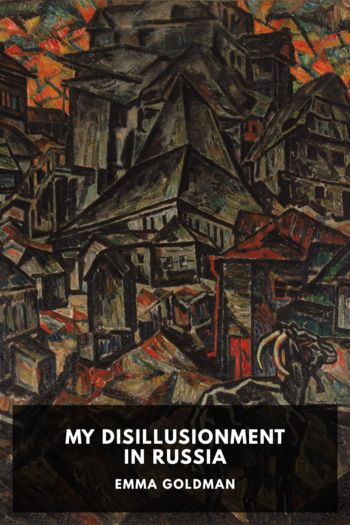My Disillusionment in Russia Emma Goldman (the beginning after the end read novel TXT) 📖

- Author: Emma Goldman
Book online «My Disillusionment in Russia Emma Goldman (the beginning after the end read novel TXT) 📖». Author Emma Goldman
Late into the night the young woman related the story of Makhno and makhnovstchina. Her voice, held low because of the danger of the situation, was rich and mellow, her eyes shone with the intensity of emotion. “Nestor wants you to tell the comrades of America and Europe,” she concluded, “that he is one of them—an Anarchist whose aim is to defend the Revolution against all enemies. He is trying to direct the innate rebellious spirit of the Ukrainian peasant into organized Anarchist channels. He feels that he cannot accomplish it himself without the aid of the Anarchists of Russia. He himself is entirely occupied with military matters, and he has therefore invited his comrades throughout the country to take charge of the educational work. His ultimate plan is to take possession of a small territory in Ukraine and there establish a free commune. Meanwhile, he is determined to fight every reactionary force.”
Makhno was very anxious to confer personally with Alexander Berkman and myself, and he proposed the following plan. He would arrange to take any small town or village between Kiev and Kharkov where our car might happen to be. It would be carried out without any use of violence, the place being captured by surprise. The stratagem would have the appearance of our having been taken prisoners, and protection would be guaranteed to the other members of the Expedition. After our conference we would be given safe conduct to our car. It would at the same time insure us against the Bolsheviki, for the whole scheme would be carried out in military manner, similar to a regular Makhno raid. The plan promised a very interesting adventure and we were anxious for an opportunity to meet Makhno personally. Yet we could not expose the other members of the Expedition to the risk involved in such an undertaking. We decided not to avail ourselves of the offer, hoping that another occasion might present itself to meet the povstantsi leader.
Makhno’s wife had been a country school teacher; she possessed considerable information and was intensely interested in all cultural problems. She plied me with questions about American women, whether they had really become emancipated and enjoyed equal rights. The young woman had been with Makhno and his army for several years, but she could not reconcile herself to the primitive attitude of her people in regard to woman. The Ukrainian woman, she said, was considered an object of sex and motherhood only. Nestor himself was no exception in this matter. Was it different in America? Did the American woman believe in free motherhood and was she familiar with the subject of birth control?
It was astonishing to hear such questions from a peasant girl. I thought it most remarkable that a woman born and reared so far from the scene of woman’s struggle for emancipation should yet be so alive to its problems. I spoke to the girl of the activities of the advanced women of America, of their achievements and of the work yet to be done for woman’s emancipation. I mentioned some of the literature dealing with these subjects. She listened eagerly. “I must get hold of something to help our peasant women. They are just beasts of burden,” she said.
Early the next morning we saw her safely out of the house. The same day, while visiting the Anarchist club, I witnessed a peculiar sight. The club had recently been reopened after having been raided by the Cheka. The local Anarchists met in the club rooms for study and lectures; Anarchist literature was also to be had there. While conversing with some friends I noticed a group of prisoners passing on the street below. Just as they neared the Anarchist headquarters several of them looked up, having evidently noticed the large sign over the club rooms. Suddenly they straightened up, took off their caps, bowed, and then passed on. I turned to my friends. “Those peasants are probably makhnovstsi,” they said; “the Anarchist headquarters are sacred precincts to them.” How exceptional the Russian soul, I thought, wondering whether a group of American workers or farmers could be so imbued with an ideal as to express it in the simple and significant way the makhnovstsi did. To the Russian his belief is indeed an inspiration.
Our stay in Kiev was rich in varied experiences and impressions. It was a strenuous time during which we met people of different social strata and gathered much valuable information and material. We closed our visit with a short trip on the river Dniepr to view some of the old monasteries and cathedrals, among them the celebrated Sophievski and Vladimir. Imposing edifices, which remained intact during all the revolutionary changes, even their inner life continuing as before. In one of the monasteries we enjoyed the hospitality of the sisters who treated us to real Russian tea, black bread, and honey. They lived as if nothing had happened in Russia since 1914; it was as if they had passed the last years outside of the world. The monks still continued to show to the curious the sacred caves of the Vladimir Cathedral and the places where the saints had been walled in, their ossified bodies now on exhibition. Visitors were daily taken through the vaults, the accompanying priests pointing out the cells of the celebrated martyrs and reciting the biographies of the most important of the holy family. Some of the stories related were wonderful beyond all human credence, breathing holy superstition with every pore. The Red Army soldiers in our group looked rather dubious at the fantastic tales of the priests. Evidently the Revolution had influenced their religious spirit and developed a sceptical attitude toward miracle





Comments (0)